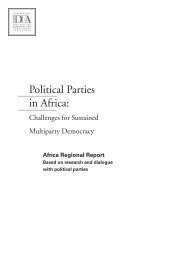FOLKETINGET – THE DANISH PARLIAMENT
FOLKETINGET – THE DANISH PARLIAMENT
FOLKETINGET – THE DANISH PARLIAMENT
Create successful ePaper yourself
Turn your PDF publications into a flip-book with our unique Google optimized e-Paper software.
8<br />
In Denmark, Cabinet responsibility<br />
means that a Governement must<br />
step down or call for a general<br />
election if it is confronted with a<br />
vote of no confidence or finds itself<br />
in a minority in the Folketing.<br />
DanIsh Democracy<br />
rights and duties<br />
It is characteristic of Danish democracy that the<br />
administration of the State is based on a voluntary<br />
agreement between the constitutional monarchy<br />
and the citizens of the country. The citizens have<br />
no direct influence on the administration of the<br />
State but exert their influence indirectly by voting.<br />
Referenda open up the possibility of gaining a<br />
direct popular influence. At the same time, citizens<br />
acknowledge the principle that it is up to the<br />
majority to make decisions and that one is in duty<br />
bound to observe the laws, to pay taxes, to do<br />
one’s military service etc. In return for this, the<br />
Constitutional Act gives the citizens some<br />
important rights and liberties so that they may<br />
feel free to act as they think fit in relation to their<br />
elected representatives. If a majority of citizens<br />
decide to exert their influence by means of their<br />
right to vote, they may remove politicians whom<br />
they find unsuited to wield power. And in accordance<br />
with the last part of the Constitutional Act<br />
(Sections 71-85), all citizens are guaranteed their<br />
personal liberties and are protected against<br />
infringements e.g. by the universal freedom of<br />
speech, the freedom of assembly, the safeguarding<br />
of private property, equal employment<br />
opportunities and the right to benefit from social<br />
services.<br />
separation of powers<br />
In order to ensure a stable democracy and to<br />
prevent misuse of power, the supreme power in<br />
Denmark is, like in most other Western democracies,<br />
divided into three independent organs which<br />
control one another i.e. the legislative, the<br />
executive and the judicial powers. The Parliament<br />
is the sole organ empowered to legislate. However,<br />
the Acts only take effect after receiving the Royal<br />
Assent. In practice, the Monarch is beyond the<br />
tripartite system but Her Majesty The Queen <strong>–</strong> or<br />
His Majesty The King <strong>–</strong> formally exerts authority<br />
e.g. when appointing or dismissing Ministers.<br />
The legislative and the executive powers are<br />
balanced against each other in the sense that a<br />
majority among the 179 Members of the Parliament<br />
can overthrow a Cabinet or a Minister by<br />
introducing an order paper which contains a vote<br />
of no confidence. On the other hand, the Prime<br />
Minister can dissolve the Parliament, at any time,<br />
in the hope of obtaining a more stable majority.<br />
The Ministers’ responsibility is a central point in<br />
democracy. They have extensive competences but<br />
are still under the control of the parliament and its<br />
25 standing committees.<br />
In special cases, Ministers may be impeached.

















